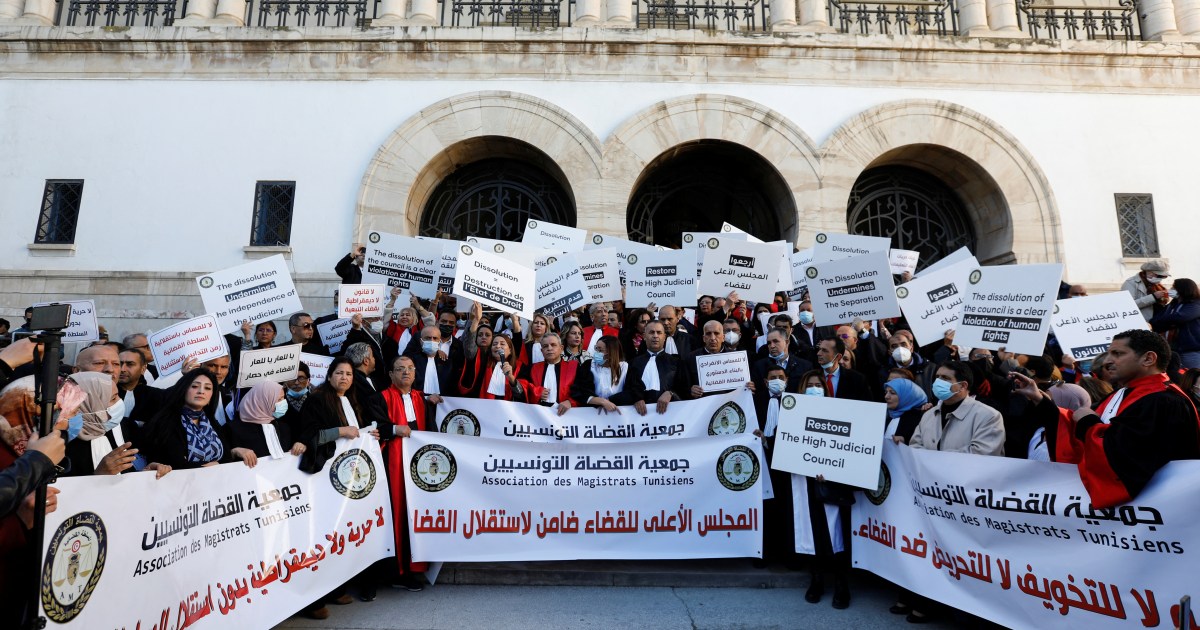Tunisian judges organized a protest in front of the Palace of Justice in the capital, to protest against the announcement by the country's president, Kais Saied, to dissolve the Supreme Judicial Council.
During the sit-in, which witnessed an intense local and foreign media presence, the protesters raised slogans adhering to the independence of the judiciary, and others considered the decision to dissolve the council to restore the image of the judiciary under executive authority.
During the sit-in, the head of the Judges Association, Anas Al-Hammadi, expressed the Tunisian judges' adherence to the Supreme Council, describing the decision to dissolve it as a siege of the judicial authority in order to subjugate it, as he put it.
The sit-down coincided with a strike carried out by judges for the second day, at a time when Tunisian Justice Minister Leila Jaffal confirmed President Said's adherence to the council and his keenness to review the law regulating it, as she put it.
There is no independent judiciary
President Qais Saeed had reiterated his assertion that there is no independent judicial authority in the state, but rather a function in the state, as he put it.
Saeed announced during a meeting with Minister of Foreign Affairs Othman Al-Jarandi that he will present a draft decree to a temporary council of the judiciary today, Thursday.
President Said also questioned the reasons for the concern expressed by countries and embassies accredited in Tunisia regarding the dissolution of the Supreme Judicial Council, and said that those parties did not express their concern about a long delay in terrorism cases, for example.
The President of Tunisia also stressed that his country is a sovereign state that knows well international treaties.
Meanwhile, Human Rights Watch spokesman in the Middle East and North Africa Ahmed Benchemsi said in an interview with Al Jazeera that the dissolution of the Supreme Judicial Council by President Kais Saied is a serious threat to fair trial rights.
The organization had said that the facts in Tunisia indicate that house arrests are exceptional measures outside the framework of the law, and fall within the arbitrary measures.
Judges' endorsement
For its part, the Ennahda movement's bloc in the Tunisian parliament expressed, on Thursday, its rejection of the country's president, Kais Saied, announcing the dissolution of the Supreme Judicial Council, and its support for the judges' protests against the decision.
In a statement, the bloc affirmed its refusal to dissolve the "Supreme Judicial Council, and the dangerous attempt to control this vital institution of the country and undermine its independence and constitutional structure."
It also expressed its full support for all the struggles announced by the judges in protest of Said's announcement of the dissolution of the council.
On Tuesday, the Association of Tunisian Judges (non-governmental) called for the suspension of work in all courts on Wednesday and Thursday, in protest of President Said's decision.
The Ennahda movement called on "all friendly and democratic parliaments to support the Tunisian parliament to restore the country's democratic path."
The Supreme Judicial Council is an independent constitutional body whose tasks include ensuring the independence of the judiciary, holding judges accountable, and granting them professional promotions.
Tunisia has witnessed a severe political crisis, since July 25, 2021, when Said began imposing exceptional measures, including freezing the powers of Parliament, issuing legislation by presidential decrees, dismissing the government, and appointing new ones.
Saeed, who began a 5-year presidential term in 2019, said that his measures are measures within the framework of the constitution to protect the state from imminent danger, and stressed that rights and freedoms should not be violated.

